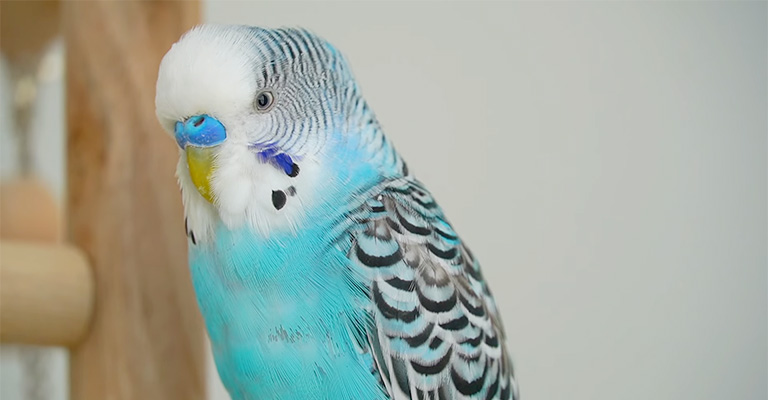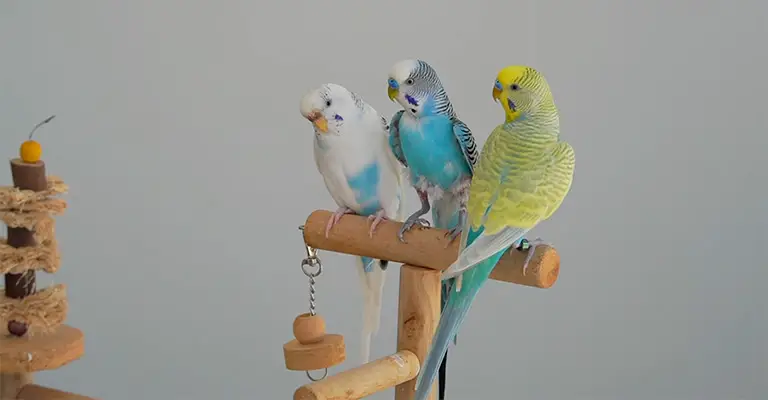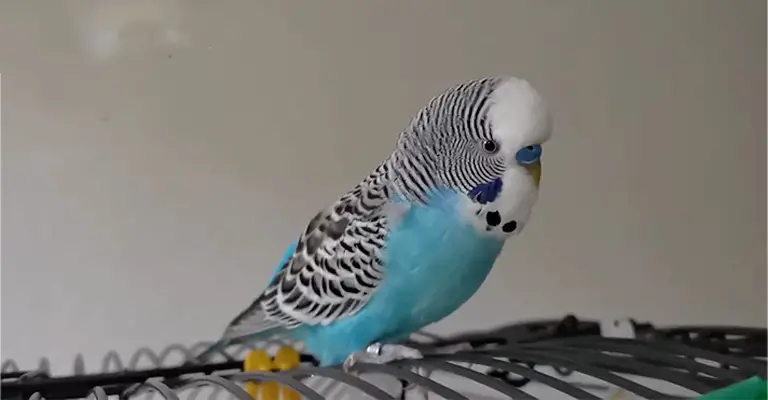The enchanting world of avian companionship often introduces us to the delightful company of budgies, those small, vibrant parrots that bring joy to countless homes. However, the avian soundscape can occasionally throw a curveball when a budgie starts producing pigeon-like noises.
This intriguing phenomenon sparks curiosity and concern among pet owners, prompting them to delve into the underlying reasons behind this unexpected vocal behaviour.
Budgerigars, known for their chattering, melodious tunes, might perplex their caretakers with sounds reminiscent of pigeons cooing.
To decode this enigma, we must explore the diverse vocalizations that budgies are capable of and the potential factors that drive them to mimic pigeon sounds.
From biological instincts to environmental influences, multiple factors might contribute to this fascinating avian behaviour.
By understanding why Is My Budgie Making Pigeon Noises budgie, enthusiasts can ensure the well-being and contentment of their feathered companions.

Why Is My Budgie Making Pigeon Noises?
There are many possible reasons why your Budgie is making pigeon noises. Here are some of them:
Imitation
Budgies are known to imitate sounds they hear, including the sounds of other birds, such as pigeons.
Budgies have a special vocal organ called the syrinx, which allows them to manipulate sounds and produce a wide range of vocalizations. Your Budgie may be copying the pigeon noises out of sheer mimicry or curiosity.
Communication
Budgies may make pigeon-like noises to communicate with other birds or their human family.
Birds use a vast array of calls and songs to convey messages to other birds. Your Budgie may be trying to reach out and establish connections with other birds in its vicinity, such as pigeons.
Alternatively, your Budgie may be using the pigeon noises to grab your attention and engage in playful interactions with you.
Environment
Your Budgie’s surroundings may influence its vocalizations. Birds are highly sensitive to the sounds they hear around them, and they often incorporate those sounds into their vocalizations.
If your Budgie has been exposed to the sounds of pigeons, it may be reproducing those sounds as a result of environmental influences.
Stress

Budgies, like any living creature, can experience stress or anxiety. And their vocalizations can be a reflection of their emotional state.
Just like humans, budgies have their ways of expressing their inner turmoil. Those pigeon noises your Budgie is making could be an indication that it’s feeling a bit frazzled.
Some common causes of stress for budgies include loud noises, sudden changes, lack of socialization, boredom, illness, or injury.
Happiness
Budgies may make chirping, trilling, or chattering noises when they feel happy or excited.
These noises may sound similar to pigeon coos or calls. Your Budgie may be making pigeon noises to express its joy or satisfaction with something, such as its food, toys, cage, or companions.
Playfulness
Budgies are very playful and curious birds. They love to explore new things and have fun with their toys or mates.
Your Budgie may be making pigeon noises as part of its playful antics. It may be trying to amuse itself or you with its vocal skills. Your Budgie may also be mimicking the pigeon noises to mock or tease them.
Boredom
Budgies need mental stimulation and physical activity to keep them healthy and happy. If they don’t get enough of these, they may become bored and restless.
Your Budgie may be making pigeon noises out of boredom or frustration. It may be seeking some entertainment or attention from you or other birds.
Hormones
Budgies may go through hormonal changes during certain times of the year, such as spring or summer.
These changes may affect their behaviour and mood. Your Budgie may be making pigeon noises as a sign of hormonal activity. It may be trying to attract a mate or show its dominance over other birds.
Personality
Budgies have different personalities and preferences. Some budgies are more vocal than others. Some budgies like certain sounds more than others.
Your Budgie may be making pigeon noises simply because it likes them or finds them amusing. It may be part of its unique character and style.
What Is Budgie’s Normal Sound?

Budgies are very vocal birds that can make a variety of sounds to express their emotions, needs, and desires.
Here are some common budgie sounds and what they mean:
Chattering
This is the normal sound that budgies make when they are content, relaxed, or happy.
They chatter to themselves, to other budgies, or to their human companions. Chattering can sound like soft or loud chirping, warbling, whistling, or muttering. Chattering is a sign that your Budgie is comfortable and enjoying its environment.
Singing
This is a sound that budgies make when they are very happy, excited, or flirty. Singing can sound like musical notes, trills, or melodies.
Singing is often accompanied by head bobbing, dancing, or displaying. Singing is a sign that your Budgie is in a good mood and wants to attract attention or impress a mate.
Beak grinding
This is a sound that budgies make when they rub their upper and lower beaks together.
Beak grinding can sound like clicking, scraping, or knocking. Beak grinding is a sign that your Budgie is calm, content, and ready to sleep.
Contact Call
This is a sound that budgies make when they want to check on their flock members or communicate their location.
Contact calls can sound like short, loud, or high-pitched cheeps or squawks. Contact calls are a sign that your Budgie is curious, social, or worried about its flock mates.
Chiding
This is a sound that budgies make when they want to warn, scold, or tell off another bird or person.
Chiding can sound harsh, rapid, or repetitive eeks or eeks. Chiding is a sign that your Budgie is annoyed, angry, or defensive.
Screaming
This is a sound that budgies make when they are scared, startled, or in danger. Screaming can sound like loud, shrill, or piercing shrieks or cries.
Screaming is a sign that your Budgie is in distress and needs your immediate attention.
Mimicking
This is a sound that budgies make when they imitate other sounds they hear, such as human speech, music, phone rings, or other bird calls.
Mimicking can sound like words, phrases, tunes, or noises. Mimicking is a sign that your Budgie is intelligent, curious, and attentive.
What To Do If My Budgie Making Pigeon Noises?

If your Budgie is making pigeon noises, you may wonder what to do about it. Here are some possible actions you can take:
Listen and Observe
The first thing you can do is to listen carefully and observe your Budgie’s behaviour and body language.
Try to understand what your Budgie is trying to communicate or express through its pigeon noises. Is it happy, curious, bored, stressed, or hormonal?
Is it mimicking, playing, warning, or calling? By listening and observing, you can get a better idea of your Budgie’s needs and emotions.
Respond and Interact
The next thing you can do is respond and interact with your Budgie. If your Budgie is making pigeon noises to get your attention or bond with you, you can talk back to it, praise it, or give it a treat.
You can also play with your Budgie, teach it new tricks, or offer it new toys. By responding and interacting, you can show your Budgie that you care and appreciate its vocal skills.
Provide Socialization
Another thing you can do is to provide socialization for your Budgie. If your Budgie is making pigeon noises to communicate with other birds or find a mate, you can introduce it to other budgies or birds.
You can also play some bird sounds or music for your Budgie to keep it company. By providing socialization, you can help your Budgie feel less lonely and more connected.
Change the Environment
You can also change the environment for your Budgie. If your Budgie is making pigeon noises because of environmental influences or boredom, you can move its cage to a different location, away from the source of the pigeon sounds.
You can also change the cage setup, add some plants or decorations, or rotate the toys. By changing the environment, you can stimulate your Budgie’s senses and curiosity.
Reduce Stress
You can also reduce stress for your Budgie. If your Budgie is making pigeon noises because of stress or anxiety, you can identify and eliminate the cause of the stress.
Some common causes of stress for budgies include loud noises, sudden changes, lack of socialization, boredom, illness, or injury.
You can also provide a calm and comfortable environment for your Budgie, with enough space, light, food, water, and sleep. By reducing stress, you can help your Budgie feel more relaxed and secure.
Manage Hormones
You can also manage hormones for your Budgie. If your Budgie is making pigeon noises because of hormonal changes or activity, you can adjust its diet and lighting schedule.
You can avoid foods that are high in fat or sugar, such as seeds, nuts, fruits, or honey.
You can also provide 12 hours of darkness and 12 hours of light for your Budgie each day. By managing hormones, you can help your Budgie balance its mood and behaviour.
Consult a Vet
The last thing you can do is consult a vet for your Budgie. If your Budgie is making pigeon noises that are unusual or excessive, it may indicate a health problem or a disease.
Some common health problems that affect budgies include respiratory infections, tumours, parasites, or injuries.
You can check your Budgie for any signs of illness or injury, such as sneezing, wheezing, coughing, bleeding, swelling, or loss of appetite. If you notice any of these signs, you should take your Budgie to a vet as soon as possible. By consulting a vet, you can ensure your Budgie’s well-being and safety.
FAQ
Budgies are natural mimics, and they might pick up sounds from their environment.
Pigeon-like noises could be influenced by exposure to pigeons or other birds. It’s their way of expanding their vocal repertoire based on what they hear around them.
Yes, health problems like respiratory infections or allergies can affect a budgie’s vocalizations.
If the pigeon-like sounds are accompanied by changes in behaviour, appetite, or energy levels, consulting an avian veterinarian is advisable.
Dietary deficiencies might impact a budgie’s health and vocalizations. Inadequate nutrition can weaken the immune system and affect respiratory health.
Ensure your Budgie’s diet includes a variety of fresh vegetables, fruits, and high-quality pellets to support overall well-being.
Yes, stress or anxiety can influence a budgie’s behaviour, including its vocalizations. Changes in their environment, lack of stimulation, or social isolation could lead to stress-related vocalizations. Providing a stimulating and enriching environment can help alleviate such issues.
Budgies thrive on social interactions and are more likely to exhibit natural vocalizations when they feel secure and content.
Regular interaction, exposure to varied sounds (including bird sounds), and the companionship of other budgies can encourage a broader range of engaging vocalizations.
Conclusion
In the captivating realm of avian communication, the puzzling occurrence of budgies emitting pigeon-like sounds adds a layer of intrigue to our understanding of these charming creatures.
As we journey through the intricate world of bird vocalizations, it becomes evident that these seemingly peculiar behaviours often stem from a blend of innate instincts and external influences.
As responsible caregivers, it is our duty to observe, analyze, and respond appropriately to these vocal expressions, ensuring the comfort and happiness of our feathered friends.
So, the next time your Budgie channels its inner pigeon, take a moment to appreciate the complex interplay of nature and nurture that shapes the avian orchestra in your home and revel in the unique quirks that make each Budgie an individual marvel in its own right.